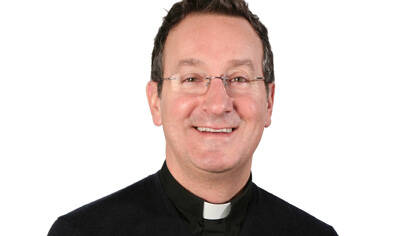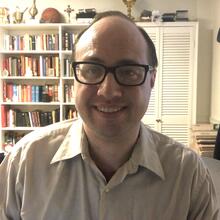Mark Bosco, S.J., is a Jesuit priest and associate professor of theology and English at Loyola University Chicago, where he also serves as director of the Center for Catholic Intellectual Heritage. Focusing on the Catholic imagination in literature and theology, Father Bosco specializes in the works of Graham Greene in addition to teaching courses on the sacraments and the aesthetics of Hans Urs von Balthasar. He holds a Ph.D. in theology and literature from the Graduate Theological Union in Berkeley, and M.Div. from the Jesuit School of Theology in Berkeley, an M.A. in English from St. Louis University, and a B.A. in philosophy from Cardinal Glennon College in St. Louis.
Fr. Bosco is the author of Graham Greene’s Catholic Imagination (Oxford University Press, 2005) and is the editor or author of several other articles and books. On June 30, I interviewed him by email about the Ignatian imagination.
What role does imagination play in the spiritual life?
I think the imagination is essential to the spiritual life, for if one cannot imagine a relationship outside of one’s own head, then there is no hope to engage the spirit. If one cannot imagine that there is a larger drama that entices or draws one out of the simply rational or physical plane of existence, then one cannot participate in anything transcendent. A line in Graham Greene’s novel, The Power and Glory, has always struck me in this regard: “hate is just a failure of the imagination.” Greene is onto something here, for if our imaginations are deformed—merely thought of as utilitarian or propagandistic—then we cannot really love.
And if love and the imagination go together, then the imagination is a spiritual reality that can draw us toward the good, the true and the beautiful, transcendental properties shared by every living being—even if latent or hidden under the surface of reality. We might even critique the secular imaginative constructs of our contemporary times by suggesting that it is full of exaggerations and distortions that have truncated the religious character of our imaginations, truncated our ability to love.
In your view, what are some distinctive features of the imagination of St. Ignatius of Loyola?
I have always been struck with how Ignatius’s own spiritual pilgrimage is about understanding the nuances of his imagination as a site to meet God. This is his great gift in the Spiritual Exercises. He helps us to deconstruct our deformed imaginations and helps us construct new and improved ones, to form a new imaginative lens “under the standard of Christ,” if you will. Or put another way, Ignatius understood that our imagination held the physical and the spiritual together, that God was revealed to us in our imaginations, allowing us to ground our aspirations and desires, in all their particularities, within the reality of Christ’s call to live free and full lives.
In a sense, Ignatius discerned in his own spiritual life what real freedom and real fullness could mean, and created a course of exercises that we, too, could do in order to be free and full human persons. Bound up in this freedom is agency—we can make a difference in the world because we can imagine ourselves as players in that world.
How do you define imagination?
The imagination is an interpretive act of the whole person, not relegated to a separate intellectual act of signification. It both interprets reality and draws out the will to act on that interpretation of reality. One might even say the imagination is our inborn hermeneutic. Thus for me—and I am only following the line of thought of both saints and artists—the imagination is the motor that conveys reality in a way that does not separate meaning from our experience; it serves to grasp our lives as meaningful.
What does “Ignatian” mean to you?
Ignatian is the proper term to describe a spirituality that is formed by Ignatius’ own life. As he discovered a path to “find God in all things,” so too those who practice Ignatian spirituality or Ignatian pedagogy share this noetic striving, this impulse to see grace at work in the world, because God made the world and all things can be proper revelations of God’s grace.
What does the phrase “Ignatian imagination” suggest to you?
It suggests an imagination alert to the nuances of grace hidden within all of reality, even in realities that are painful or sinful. It suggests an imagination activated to discern the hand of God in the world, not as some coercive power, but as a presence, a mystery.
What are some cultural products of an Ignatian imagination?
The list is long, but I would say that baroque Rome—or the religious aesthetics of the 17th century when Jesuits helped shape Catholic culture—is a product of that imagination. Go to Rome and there is this sense of baroque accessibility—the art engages the senses of everyone, whether smart or ignorant, young or old, rich or poor. And this sense of baroque excessiveness overwhelms one as a sensual experience, taking seriously that God can be sensed, can be encountered in art. Whether in the churches and sculptures of Bernini, the dramatic chiaroscuro of Caravaggio, or the wonderfully playful ceilings of the Church of the Gesu or San Ignazio in Rome, you have an Ignatian imagination at work. But I like to think—and continue to write about—how Catholic literary aesthetics of the 20th century are very Ignatian.
Authors like Flannery O’Connor strike me as Ignatian, as does Graham Greene. The poet Denise Levertov even draws comparisons of her poetic vision in light of her experience with the Spiritual Exercises. As does the poet and memoirist Mary Karr. I think many of these more contemporary artists have found sustenance from their encounter with Ignatian spirituality.
What aspects of Ignatian spirituality are most indicative of an Ignatian imagination?
I would say that if one is fluent in Ignatian spirituality, then one can sense that the imagination is not something to be coerced, not to be manipulated, whether it be down the avenues of dogma, romantic sentiment, or plain old kitsch. One must respect the imagination as an expression of something greater than oneself. In a word, someone steeped in Ignatian spirituality is open to mystery.
How does imagination relate to prayer in Ignatian spirituality?
Ignatius constantly invites one to begin a moment of contemplation through the composition of place, to use all of your senses in order to come into a scene. Often called imaginative contemplation or the application of the senses, it draws the person to have faith that their imagination will take them deeper into the drama of the life of Christ and, conversely, reveal God’s intimacy within one’s own imaginative insight in that drama.
What are some of the graces you’ve experienced from using your imagination in prayer?
There have been many graces from this way of praying, but I always come back to one moment in particular, early in my Jesuit life. I was asked by my spiritual director to imagine myself near Jesus as he was delivering the sermon on the mount. I had tried all day to make this moment come alive in my imagination but I kept on getting bogged down in technical considerations, as if I was merely a film director, documenting the crowds around Jesus, or what Jesus was saying. On my third repetition of this meditation, I was again on the periphery of the scene when suddenly Jesus is right in my face, saying to me, “You are the light of the world, you are the salt of the earth.” There was both joy and a command in Jesus’s voice. I was so startled that I think I even said aloud, “No, no! You, Jesus are the light, not me! You are the salt. I will follow from the rear!”
I felt this moment of intimacy and of challenge from Jesus to accept and to possibly live as light for others, as salt to flavor the world. It made me understand how part of me still thinks I am not worthy, or, more accurately, how part of me doesn’t want to go all the way with the Lord. I always thought it good to be a follower of Christ, but I was ambivalent about my ability to actually be that light, be that salt, be Christ for others. It is a revelation that continues to challenge me.
What are some of the challenges you’ve faced in using your imagination in prayer?
Sometimes it is just hard, becausewe are overloaded with information and have little room or knowhow to engage our imaginations. I find that it is a lot of work to give up my sense that I am the master of my own imagination. Until then, I don’t believe God can really enter into the moment.
What would you say to someone who wants to incorporate an Ignatian imagination in his or her spiritual life for the first time?
Go slow and read stories and novels, for there is a connection to the great imaginative works of culture and our own habit of being. Read the Gospel parables, read Flannery O’Connor, read authors who move you in a deep and rich way. They are moving your imagination after all, a pretty good first step in the spiritual life.
Any final thoughts or words of wisdom?
Very little wisdom, but a final thought: Ignatian spirituality is all about making your life a beautiful work of art, an adventure of your life. Whether you are an Ignatius, a Francis Xavier, whether you are a Thomas Merton or a Mother Teresa, you must imagine that you are free to become what in God’s eyes you are: another Christ.
Sean Salai, S.J., is a contributing writer at America.







